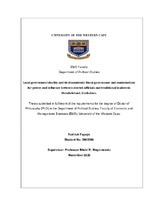| dc.contributor.advisor | Bheki, R. | |
| dc.contributor.author | Fayayo, Rodrick | |
| dc.date.accessioned | 2021-04-07T08:13:32Z | |
| dc.date.available | 2021-04-07T08:13:32Z | |
| dc.date.issued | 2020 | |
| dc.identifier.uri | http://hdl.handle.net/11394/8153 | |
| dc.description | Philosophiae Doctor - PhD | en_US |
| dc.description.abstract | This thesis deploys deliberative democracy in order to explore interactions in polity dualism in
Matebeleland South and Matebeleland North, in Zimbabwe. The thesis was premised on two
major problems in the way the issue of traditional leadership is generally talked about and
studied. First, there is a theoretical problem in terms of how we study and talk about traditional
leaders and their contribution in a democracy. Secondly, the institution of traditional leadership
is assessed based on assumptions as opposed to hard facts. Methodologically, the study is
based on a qualitative case study research design using focus group discussions, key
informant interviews and document analysis that enabled an analysis of perceptions, opinions,
experiences, and attitudes of residents regarding Zimbabwe’s dual local government system. | en_US |
| dc.language.iso | en | en_US |
| dc.publisher | University of the Western Cape | en_US |
| dc.subject | Politicians | en_US |
| dc.subject | Traditional leaders | en_US |
| dc.subject | Zimbabwe | en_US |
| dc.subject | Rural governance | en_US |
| dc.subject | Democracy | en_US |
| dc.title | Local government duality and its discontents: Rural governance and contestations for power and influence between elected officials and traditional leaders in Matabeleland, Zimbabwe | en_US |
| dc.rights.holder | University of the Western Cape | en_US |

